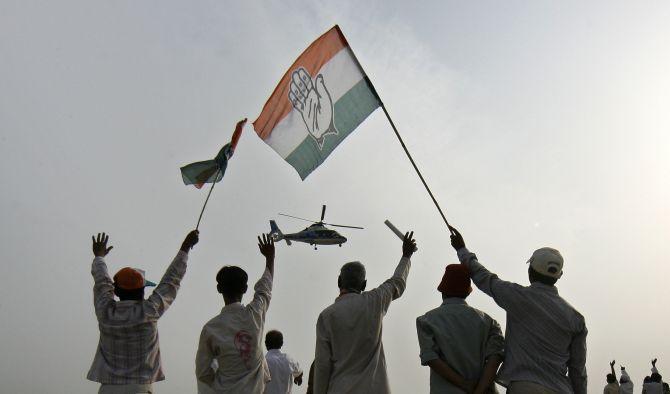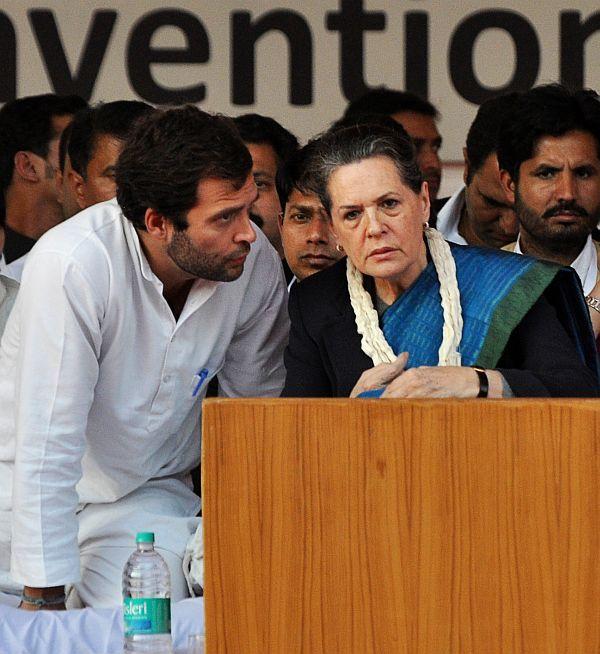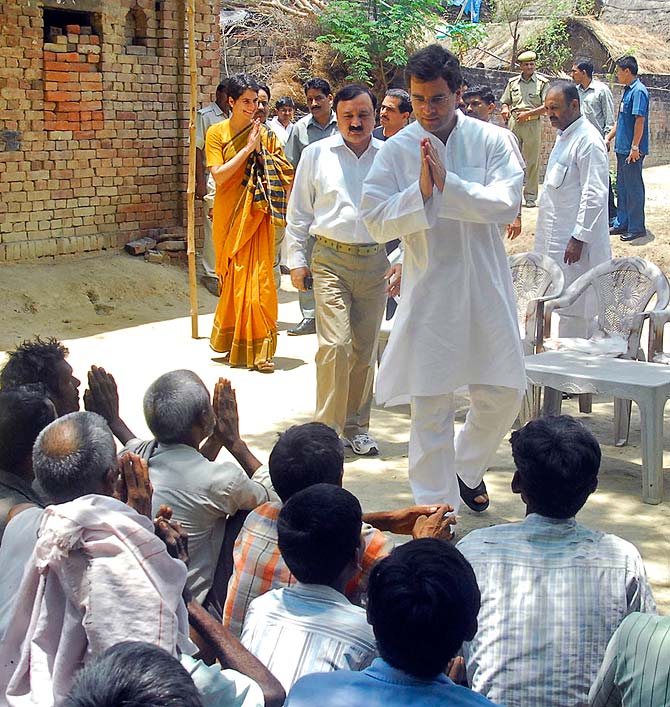Photographs: Adnan Abidi/Reuters Anita Katyal
Faced with a demoralised army, the Congress leadership has to find the right answers as the party heads into what is fast turning out to be an extremely tough electoral battle, says Anita Katyal.
Shell-shocked after its humiliating defeat in the recent assembly polls, the Congress is in desperate search of a political message that will provide the necessary inspiration to the party's rank and file who will assemble at the Talkatora Stadium in Delhi on January 17 for the All India Congress Committee’s annual meeting.
The Congress cadres are eagerly awaiting a clear and strong direction from the party leadership as they prepare for a crucial Lok Sabha poll this summer. Their expectations are not out of place as this is the first major meeting of Congress workers after the party’s electoral rout. Also, there will be no further occasion for them to meet before the April general election.
Consequently, next week’s meeting has acquired special significance. Finding itself face-to-face with a demoralised army, the Congress leadership has to find the right answers as the party heads into what is fast turning out to be an extremely tough electoral battle.
What is evident is that the Congress is essentially in need of an image makeover as the grand old party seeks to restore its credibility, shake off the growing perception that it is corrupt and inept, and position its vice-president Rahul Gandhi as an effective leader who has the necessary credentials to lead the country.
...
Contrary views over naming Rahul as PM nominee reflect internal debate in the Congress
Image: Congress President Sonia Gandhi and Vice president Rahul GandhiPhotographs: Reuters Anita Katyal
Although it is expected that Rahul Gandhi will be named the party’s prime ministerial candidate at this meeting, there is many a slip between the cup and the lip. For one, Rahul Gandhi is reluctant to take on this responsibility. Second, there is a deep divide in the party on this issue.
This came to the fore recently when Union ministers P Chidambaram and Sushil Kumar Shinde publicly stated that the party should name its prime ministerial candidate before the elections, while AICC general secretary Digvijaya Singh felt there was no need to do so. “In a parliamentary democracy, there is no need to declare a prime ministerial candidate," he said adding that this decision is taken by the elected MPs.
These contrary views actually reflect the ongoing internal debate in the Congress on whether it wants the coming election to be a “Rahul vs Modi’ contest or a battle between the Congress and the BJP, and between two ideologies. Either way, the Congress is on a weak wicket.
While the Bharatiya Janata Party’s prime ministerial candidate Narendra Modi has successfully weaned away the urban middle classes, the youth and the corporate sector from the grand old party, the BJP’s recent electoral successes have given it a clear head start in the Lok Sabha elections.
Moreover, Rahul Gandhi has a lot of catching up to do as Modi’s popularity ratings continue to soar. The Congress vice-president has, so far, not lived up to expectations as all his experiments (like democratisation of the party’s youth wings) have come a cropper.
The string of electoral reverses suffered by the Congress on his watch has raised serious doubts about his abilities to lead the party. As compared to his mother, Rahul Gandhi’s performance has not been particularly inspiring. He lacks charisma and credibility and his oratorical skills can best be described as mediocre. Moreover, he has acquired the reputation of being a “part-time” politician who never speaks out on key issues. Rahul Gandhi has largely been an absentee parliamentarian and was famously silent during the street protests against corruption and the Delhi gangrape case.
...
Chances of Congress's recovery are slim as it faces its worst credibility crisis
Anita Katyal
The most important task before the Congress leadership today is to re-energise and revitalise its workers, and prepare them for the battle ahead. The morale of party workers has hit an all-time low after the Congress’ poor performance in the assembly elections.
A sense of desperation has gripped them as there is a growing realisation in the party that its future prospects are not particularly bright. The Congress could be in for a severe drubbing in the coming Lok Sabha polls.
The reasons for their depression are not far to seek. Take a look at how the 128-year-old party’s footprint across the country has gradually shrunk. The Congress is pitted against a formidable opponent in the states of Madhya Pradesh, Chhattisgarh and Punjab where it has been singularly unsuccessful in dethroning the incumbent governments led by the Bharatiya Janata Party and its ally, the Akali Dal. It is the same story in Gujarat where its chief minister Narendra Modi remains the unchallenged leader.
While it has failed to pin down its rivals, the Congress has been unable to save its own governments in Delhi and Rajasthan which were widely perceived to be a testing ground for the United Progressive Alliance government’s pro-poor schemes.
The grand old party was banking on its flagship programmes to revive its sagging political fortunes but the groundswell of anger against the Congress has made this a near-impossible task. After the mauling it got in these states, there is little chance that the Congress will be able to change people’s perception about it in time for the the Lok Sabha polls which are only four months away.
Reports from the Congress-led states of Haryana, Uttarakhand and Himachal Pradesh further suggest that the party is heading towards a whitewash here.
Moving on, the Congress has virtually no presence in states like Uttar Pradesh, Bihar, West Bengal and Tamil Nadu (accounting for 200-odd seats) where the grand old party has ceded ground to regional players like the Samajwadi Party, the Bahujan Samaj Party , the Rashtriya Janata Dal and the Janata Dal-United.
The grand old party has proved to be a virtual non-starter in Odisha where Biju Janata Dal’s Naveen Patnaik is sitting pretty. Andhra Pradesh, the one state where the Congress had done spectacularly well in the last two elections, has also slipped out of its hands because of its poor handling of the Telangana movement and the growing popularity of Jaganmohan Reddy’s YSR Congress.
The Congress was hoping to make good in Karnataka and Maharashtra but the return of B S Yeddyuarappa to the BJP fold and the emergence of Aam Admi Party in Delhi has upset its calculations as the debutant party is expected to make deep inroads in urban centres across the country, especially Mumbai, Bengaluru and Pune.
Chances of recovery are very slim as the Congress is facing its worst credibility crisis today. The grand old party has to contend with ten years of anti-incumbency as the UPA government has been under constant attack for a series of corruption charges, its inability to control inflation, poor governance and weak leadership.
The party has lost the support of the urban middle classes and the youth, who had gravitated towards the Congress in the 2009 Lok Sabha elections because of Prime Minister Manmohan Singh and party vice-president Rahul Gandhi. But the two leaders no longer hold the same attraction for these sections. Often described as “Singh is King” in the first term of the UPA government, the prime minister has appeared out of depth in the second term. Once looked upon as a valuable asset for the party, he is increasingly being viewed as a liability.
While Manmohan Singh’s image has taken a beating, Congress president Sonia Gandhi cannot escape blame either as she has failed to rise to the challenge in UPA II. Partially because of her poor health and largely because of her desire to push Rahul Gandhi to the forefront, Sonia Gandhi was not as proactive as she should have been. Instead of using its stint in the government to build the party in the past decade, the leadership has frittered away this opportunity as the Congress has actually shrunk during this period.
Moreover, there has been a growing disconnect between the party and the government and the Congress and its allies. Congress leaders have been complaining that the government’s top brass -- read Manmohan Singh and Finance Minister P Chidambaram -- do not appear to have a stake in the party’s future which, according to them, is reflected in their economic policies which, in turn, cost them the recent assembly polls.
On the other hand, Congress ministers complain that there has been all-round failure in highlighting the government’s achievements and countering the opposition’s propaganda against them.
Given this bleak scenario, it will take more than a fiery speech by Congress president Sonia Gandhi at the AICC meeting to shake the workers out of their despondency. Well aware of the mood in the party, Sonia Gandhi had valiantly declared at the Congress foundation day function last December that the party is determined to win the 2014 Lok Sabha elections.
“There are big challenges before us but we are united and determined to fight and win", she said. The Congress president had made a similar attempt earlier in her address to party MPs when she had urged them to forget the past and work unitedly for the forthcoming electoral challenge. A similar spirited message can be expected from Sonia Gandhi at the coming session.
For the moment, the Congress has got some respite since it is no longer the sole target of BJP’s attack as the principal opposition party has now trained its guns at the newbie Arvind Kejriwal-led AAP. Although a temporary phenomenon, this slugfest has deflected attention from the Congress party’s sins of omission and commission, providing its leadership the necessary breathing space to regroup its forces and come up with a much-needed fresh strategy, programme and message for the upcoming electoral challenge.
...
Congress strategists are working overtime to re-invent Rahul Gandhi
Photographs: Reuters Anita Katyal
Now that Manmohan Singh has declared that he will hand over the baton to a new prime minister, hopefully from the UPA, after the April general election, the Congress has got an opportunity to pitch Rahul Gandhi as its future prime ministerial candidate, enabling the party to make a break from the past and project the Nehru-Gandhi scion as its new hope.
A formal announcement naming Rahul Gandhi as the party’s prime ministerial candidate will electrify the Congress cadres who will, in any case, make a strong pitch for such a declaration at the forthcoming AICC meeting. Jolted by the party’s debacle in the recent assembly elections and with Lok Sabha elections looming large, Congress strategists are working overtime to re-invent Rahul Gandhi.
Under constant attack for being incommunicado and inaccessible, Rahul Gandhi has finally stepped out of purdah. In what is being seen as a welcome change, he has, of late, become more communicative, has met media persons on several occasions, spoken out on important policy issues, taken ownership of the anti-corruption agenda and has even addressed representatives of India Inc in his new avatar.
But as a late entrant, Rahul Gandhi has a long way to go even as the Congress makes frenetic attempts to reposition him. This had become imperative since he comes across poorly in comparison to BJP's PM candidate Narendra Modi whose oratory and governance record have won him a huge fan following.
And now the Congress leader has a new challenger in AAP leader Arvind Kejriwal.
While he is working hard on the job, there is still no clarity about Rahul Gandhi’s rightful slot in the pantheon of new age leaders. The key question which remains unanswered is: what does the Nehru-Gandhi scion stand for. Does he have a viable roadmap for good governance?
Obviously, it will take time for “Brand Rahul” to evolve. But that is a luxury which the Congress does not have.





article